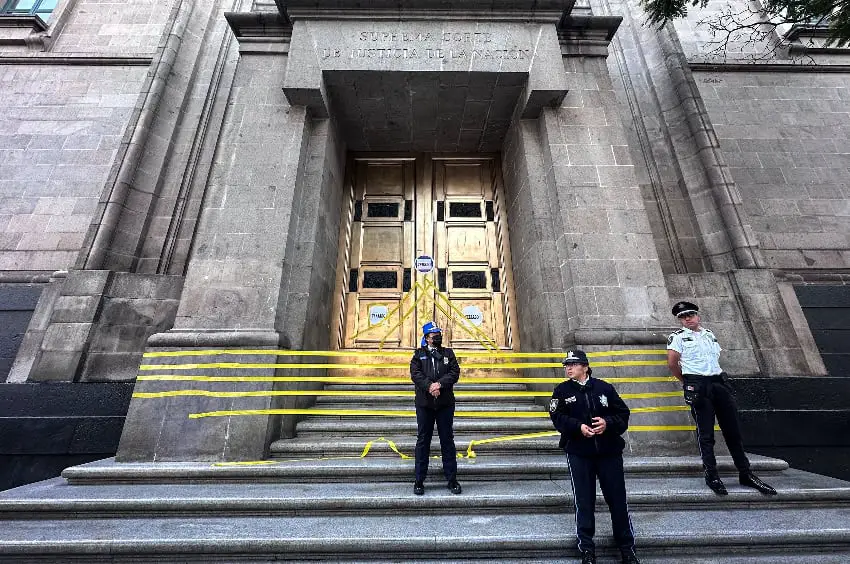There can be judicial reform without undermining trust

On Aug. 26, the American Chamber of Commerce of Mexico (AmCham) released a statement regarding the government’s judicial reform, where we warned that: “When multiple voices rise in a chorus of warnings, it is wise to pay attention. The convergence of diverse opinions on a risk is not mere coincidence but an echo of shared experiences and knowledge.”
To provide context for the conversation, I want to make two points very clear.
The first is that AmCham Mexico has been the chamber representing the binational trade relationship between Mexico and the United States since 1917. Today, we bring together more than 1,400 companies from the U.S., Mexico and around the globe; large, medium, and small; and operating in every state of the country. Together, we generate one-quarter of Mexico’s GDP and more than 10 million formal jobs.
Secondly, our Chamber has thoroughly followed and analyzed the reform process, from the president’s initial proposal to today. We have shared recommendations with the current government, the transitional government and representatives of Congress.
Our activity in Mexico for more than a century has taught us that the key to overcoming any challenge lies in dialogue, deep analysis, and finding common ground amidst differences, not in incendiary statements. This has never been and will never be AmCham’s approach. Thus, we are concerned that the discussion about the reform has been reduced to the popular election of judges, ministers, and magistrates; however, this is not the only factor that could divert Mexico from a path of growth and prosperity.
The first problem with the proposal lies in the independence of the judges elected under the conditions of the new judicial discipline tribunal. This body could sanction judges based on vague and imprecise criteria, such as “acts or omissions contrary to the law,” “administration of justice,” or subjective metrics like “excellence.” This ambiguity of criteria can lead to arbitrary sanctions and compromised justice.
A second issue is the re-election of judges. We should aim for those elected to serve for a reasonable and continuous period. Only then can we avoid the temptation for elected judges to seek popular approval rather than fulfill their primary duty, which is to administer justice.
Another relevant issue is the eligibility requirements. The criterion established in the president’s initial project, regarding the accreditation of professional experience, is essential. Our proposal includes the implementation of a knowledge and professional practice exam, developed and implemented publicly, openly, and transparently, under the supervision of law schools, faculties, and professional bar associations.
An additional concern is the implementation and its effect on the functioning of the justice system. Conservative estimates suggest that this reform would result in the election of more than 10,000 candidates among magistrates and judges from the 32 circuits nationwide. Thus, a resident of Mexico City would have to choose over 600 officials among more than 4,000 candidates, using 175 ballots — a task seemingly designed to test patience, logistics, and the very purpose of voting.
Abruptly changing 50% of the Judiciary in 2025 and the other 50% in 2027 would create significant challenges. In any scenario, we recommend a gradual implementation that allows for an orderly and viable transition without affecting ongoing cases. This could include extraordinary elections in 2025 to fill vacancies, with subsequent partial elections in 2030, 2033, 2036, and 2039.
If, at a minimum, the points previously mentioned are not modified, the social and economic impacts will be inevitable and devastating. I highlight three ways these effects could materialize in our economy.
The first and most significant impact will be on the country’s credit rating. Losing investment-grade status — a warning already raised by several institutions — would be like playing with fire: the consequences would be serious and could shake the country’s economic stability, affecting debt costs, interest rates, exchange rates, country risk, and ultimately, inflation.
The second impact is the implementation of the USMCA. The potential dysfunction of independent and specialized courts in labor matters, as well as insufficient protection of investments through alternative justice mechanisms, increases the risk of renegotiating the treaty in 2026.
Finally, the third blow will be felt in investment. With a fragile judicial structure, a downgraded credit rating, and a poorly implemented USMCA, it is to be expected that the appetite for investing in the country will diminish, ending the opportunity to take advantage of nearshoring.
The message is clear. The reform we need is one that is debated, discussed, and ideally agreed upon, combining the best of all worlds: democracy, with certainty and growth. Why take rushed steps when we all agree that we can, together, improve the national justice system?
An accessible and democratic judicial system is also achievable without undermining the rule of law and checks and balances. We are at a historic and opportune juncture to start a new government where dialogue is the cornerstone upon which we build a more democratic and just country.
Pedro Casas Alatriste is the executive vice president and CEO of the American Chamber of Commerce in Mexico.
Source: Mexico News Daily

